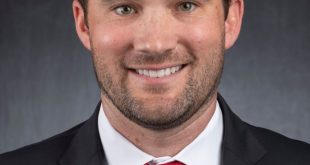Written By: Cole Edwards
Students fed up with high textbook prices now have an option to pay it forward to benefit themselves and students who follow.
In recent years, the national average cost of college textbooks has reached an all-time high, hovering around $1,100 per two semesters with the figures only continuing to rise with inflation, according to GAcollege411.
Dr. Andrew Ostapski, professor of management at VSU’s Langdale College of Business, realized the need to help his students around three years ago when he first noticed the price of books growing to alarming heights. He decided to begin a program, Project Bookshare, for the students enrolled in sections C, D and E of his “The Environment of Business” class.
Using money from one of the university funds that consisted of money from many sources including students, Ostapski was able to purchase the books for virtually nothing for his classes.
“My focus is and has always has been on my students,” Ostapski said, who has been teaching at VSU for over two decades. “I want everything to be about them.”
Project Bookshare allows students to discover the alternatives to purchasing costly textbooks by loaning copies of the two required course books for Ostapski’s classes upon request from the student.
In total, this saves students $348.42 per semester.
Adam Wright, junior business management major, volunteered on the first day of class to serve as Book-Master for the class after hearing Ostapski’s proposal of an online shopping project.
“I was in charge of finding the best deals and bringing them to Dr. Ostapski for approval,” Wright said.
Using the foundation money, Wright purchased 80 used textbooks at good prices from websites such as Chegg and Alibris to increase the available stock, which is stored in Ostapski’s office in the Health Sciences and Business Administration Building.
“I ordered about 30 packages of books and received them at my house,” Wright said. “I would unwrap them and bring them to the class to distribute to the students.”
Wright said he would buy one edition down of each book because it was cheaper and publishers would change very little content between each edition.
Students in Ostapski’s class were happy with the money they saved through the program.
“My financial aid couldn’t cover the costs of all my books,” Ronnie Lee, junior management major, said. “This program definitely saved me from having to scrape up money I didn’t have.”
“This program is good because it teaches people to share and pass on,” said Andrew Ussery, a VSU graduate working toward his MBA. “We forget that as a community, especially the younger generation, so I hope this program expands as it reinforces basic humanitarianism.”
Many students said they will often loan friends their used textbooks for other classes as well as calculator and clickers after seeing the benefit they received from the program.
Ostapski said that each semester only about two or three students fail to return the books loaned to them and cites the possibility of potential savings for all students if this approach were to spread across the university.
“If this catches on, students would be looking out for each other,” Ostapski said. “And that would be even better than getting that perfect selfie shot.”
 The Spectator The independent student newspaper of Valdosta State University
The Spectator The independent student newspaper of Valdosta State University





